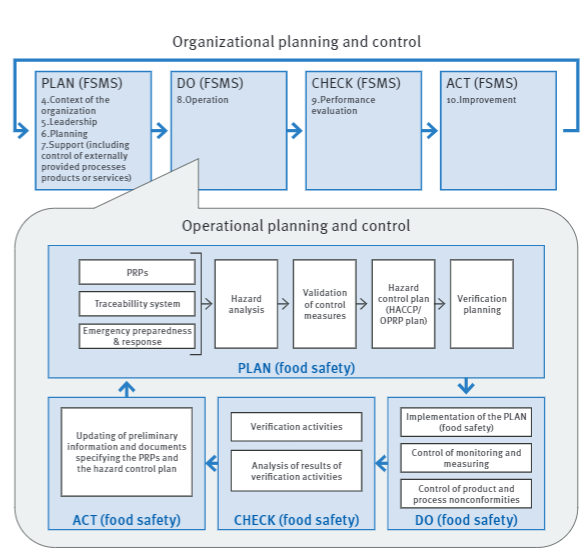In the world of food production and distribution, ensuring the safety of what we consume is paramount. This is where Food Safety Management Systems (FSMS) come into play. A FSMS is a systematic approach to controlling food safety hazards within a food business to ensure that food is safe to eat. It involves identifying, evaluating, and controlling food safety hazards at every stage of the food production process, from farm to fork.
In this blog post, we’ll take a look at what makes a FSMS, the common types, how to determine if you need one, the role of an external consultant, and other relevant information.
What is a FSMS?
A FSMS is a structured system implemented by food businesses to ensure that food is safe for consumption. It encompasses various processes, procedures, and practices designed to identify and mitigate food safety risks. The primary objectives of a FSMS are to prevent foodborne illnesses, comply with regulatory requirements, and maintain consumer confidence in the safety of the food supply chain.
Common Types of FSMS
Several FSMS standards exist, each with its own set of requirements and guidelines. Some of the most widely recognized FSMS standards include:
- ISO 22000: This international standard outlines the requirements for a food safety management system that can be applied by any organization in the food chain, from farm to fork. It emphasizes hazard analysis, risk assessment, and management commitment to food safety.
- HACCP (Hazard Analysis and Critical Control Points): HACCP is a systematic approach to identifying, evaluating, and controlling food safety hazards. It focuses on critical control points (CCPs) in the production process where hazards can be prevented, eliminated, or reduced to acceptable levels.
- FSSC 22000 (Food Safety System Certification): FSSC 22000 is a certification scheme based on ISO 22000 and includes additional requirements specific to the food sector. It provides a framework for food safety management that is recognized by global food organizations.

Do You Need a FSMS?
Determining whether your business needs a FSMS depends on various factors, including the nature of your operations, regulatory requirements, and customer expectations. Here are some indicators that suggest the need for a FSMS:
- You operate in the food industry, including production, processing, packaging, or distribution.
- You handle high-risk food products that are susceptible to contamination or spoilage.
- You export food products to countries with stringent food safety regulations.
- You want to enhance consumer confidence and demonstrate your commitment to food safety.
If any of these apply to your business, implementing a FSMS can help you ensure compliance with food safety standards and mitigate the risk of foodborne illnesses.
The Role of an External Consultant
Developing and implementing a FSMS can be a complex process that requires expertise in food safety management, regulatory compliance, and risk assessment. An external consultant with specialized knowledge and experience can play a valuable role in this endeavor. Here’s how:
- Expert Guidance: An external consultant can provide expert guidance on FSMS standards, requirements, and best practices. They can help you understand the specific needs of your business and tailor a FSMS that aligns with your objectives.
- Gap Analysis: A consultant can conduct a thorough gap analysis to identify areas where your current practices may fall short of FSMS requirements. This assessment forms the basis for developing an action plan to address deficiencies and improve compliance.
- Training and Support: Consultants can provide training to your staff on FSMS implementation, including hazard analysis, HACCP principles, and documentation requirements. They can also offer ongoing support and guidance to ensure effective implementation and maintenance of the FSMS.
- Certification Assistance: If your goal is to achieve certification to a specific FSMS standard, an external consultant can help you navigate the certification process. They can assist with documentation, audits, and preparation for certification audits conducted by third-party certification bodies.
Conclusion
In conclusion, Food Safety Management Systems are essential for ensuring the safety and quality of food products. By implementing a FSMS, food businesses can mitigate the risk of foodborne illnesses, comply with regulatory requirements, and enhance consumer confidence. Whether you operate a small-scale food operation or a large food production facility, a FSMS tailored to your specific needs can provide numerous benefits. And when it comes to developing and implementing a FSMS, partnering with an experienced external consultant can streamline the process and ensure successful outcomes. Remember, investing in food safety is not just a legal requirement but also a moral obligation to protect public health and well-being.
Take the Next Step
Ready to embark on your journey towards food safety excellence? We’re here to help. As a leading food safety and quality consultancy, we specialize in FSMS implementation and support. Whether you’re looking for expert guidance, training, or certification assistance, we have the solutions you need.
Take action today! Schedule a consultation with one of our experts. Together, let’s elevate your food safety standards and build consumer trust one step at a time.